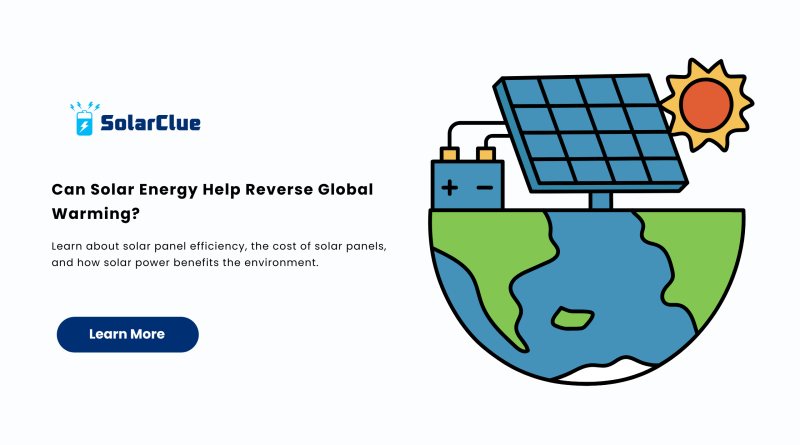Can Solar Energy Help Reverse Global Warming?
The rise in Earth’s temperature due to excessive carbon footprint and greenhouse gas emissions has led to severe climate change. Industries, fossil fuel combustion, and deforestation contribute significantly to global warming, making it a pressing issue that needs immediate action. One of the most effective solutions to combat this crisis is adopting solar energy, a clean and sustainable alternative to fossil fuels.
Table of Contents
- 1 How Does Solar Energy Help Combat Climate Change?
- 2 Benefits of Solar Energy for the Environment
- 3 How Effective Is Solar Energy in Fighting Climate Change?
- 4 Understanding the Cost of Solar Panels
- 5 Can Solar Panels Reduce Greenhouse Gases?
- 6 Solar Energy Sustainability: The Future of Green Energy
- 7 Final Thoughts
- 8 Frequently Asked Questions (FAQs)
How Does Solar Energy Help Combat Climate Change?
1. Reducing Greenhouse Gas Emissions
Switching to solar power significantly cuts down carbon emissions. Unlike fossil fuels, solar panels generate electricity without releasing harmful pollutants, leading to a lower carbon footprint and a healthier planet.
2. Promoting Sustainable Energy Solutions
The adoption of renewable energy sources like solar energy ensures long-term environmental benefits. Unlike coal or gas, solar panels rely on an infinite energy source: the sun. This makes it one of the best green energy solutions for reducing reliance on non-renewable resources.
3. The Role of Renewable Energy in Reducing Global Warming
The global transition to clean energy sources is vital in reducing heat-trapping emissions. As more homes and businesses install solar panels, dependency on coal-fired power plants decreases, leading to a significant decline in global temperatures.
Benefits of Solar Energy for the Environment
1. Solar Power Reducing Carbon Footprint
One of the most significant solar energy benefits for climate is its ability to cut carbon emissions. A single household using solar panels for home can reduce thousands of pounds of CO₂ emissions annually.
2. Improving Air Quality
Traditional electricity production releases pollutants that cause respiratory diseases. By transitioning to solar energy, we can reduce air pollution, leading to cleaner air and healthier living conditions.
3. Preserving Natural Resources
Unlike fossil fuels, solar power doesn’t deplete finite resources. Solar panel efficiency continues to improve, making it an increasingly viable alternative to coal, oil, and gas.
How Effective Is Solar Energy in Fighting Climate Change?
1. Growing Global Adoption
The increasing adoption of solar energy worldwide is proving its effectiveness. Governments and businesses are investing heavily in renewable energy, reducing the overall dependence on fossil fuels.
2. Technological Advancements in Solar Panel Efficiency
Modern solar panels have drastically improved in efficiency, making them more effective at harnessing sunlight and converting it into usable electricity. This ensures a higher return on investment and greater energy savings.
3. Encouraging Green Energy Solutions for Businesses and Homes
Governments offer incentives for installing solar panels for home and businesses, making it easier and more affordable for individuals to switch to clean energy sources.
Understanding the Cost of Solar Panels
The cost of solar panels has decreased significantly over the years, making them more accessible to households and businesses. While the initial investment may seem high, the long-term savings on electricity bills and environmental benefits outweigh the costs.
Can Solar Panels Reduce Greenhouse Gases?
Absolutely! By replacing fossil fuels with solar power, we can significantly reduce greenhouse gas emissions. Research has shown that widespread use of solar energy can lower CO₂ emissions on a global scale.
Solar Energy Sustainability: The Future of Green Energy
The future of solar energy looks promising, with continuous advancements in technology making solar panels more affordable and efficient. The widespread adoption of green energy solutions will be crucial in mitigating the effects of global warming and ensuring a sustainable future.
Final Thoughts
So, can solar energy help reverse global warming? The answer is a resounding yes! By adopting solar power, we can significantly lower our carbon footprint, improve air quality, and promote sustainable energy solutions. If you’re considering installing a solar panel for home, now is the perfect time to invest in a cleaner, greener future.
Looking for more insights on solar panels and their impact on the environment? Visit our website today to explore the best green energy solutions for your needs!
Frequently Asked Questions (FAQs)
1. How do solar panels help climate change?
Solar panels reduce dependence on fossil fuels, lowering carbon emissions and mitigating climate change effects.
2. What are the benefits of solar energy for the environment?
Solar energy decreases air pollution, conserves natural resources, and reduces greenhouse gas emissions.
3. How does solar energy help combat climate change?
By producing clean energy, solar power reduces reliance on coal, oil, and gas, significantly lowering the global carbon footprint.
4. What is the impact of solar power on global warming?
Solar power directly reduces the emission of greenhouse gases, helping slow down global warming.
5. Are solar panels a cost-effective way to fight climate change?
Yes! Despite the cost of solar panels, their long-term energy savings and environmental benefits make them a smart investment for a sustainable future.




